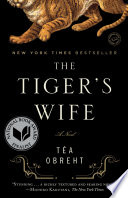
The Tiger's Wife
By - Obreht, Téa
Floor
-
Floor 3
Published
-
Random House Trade Paperbacks, New York, 2011
ISBN 10 - 0385343841
ISBN 13 - 9780385343848
Book Status
-
3 Qnty Available with us.
Subject
-
Women physicians
Shelf No
-
7
Call Number
-
813.6 OBR
Physical Description
-
353 pages ; 21 cm